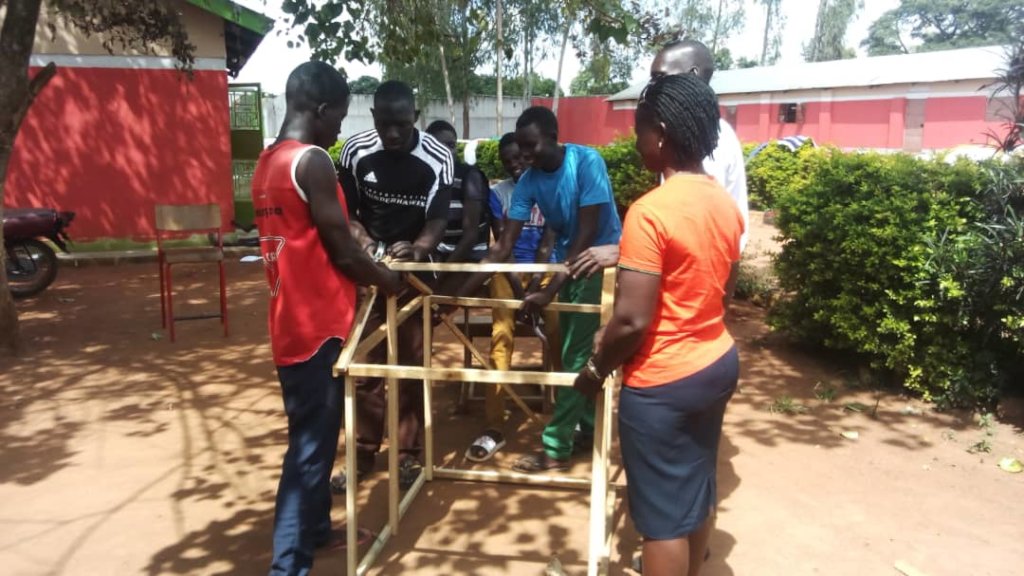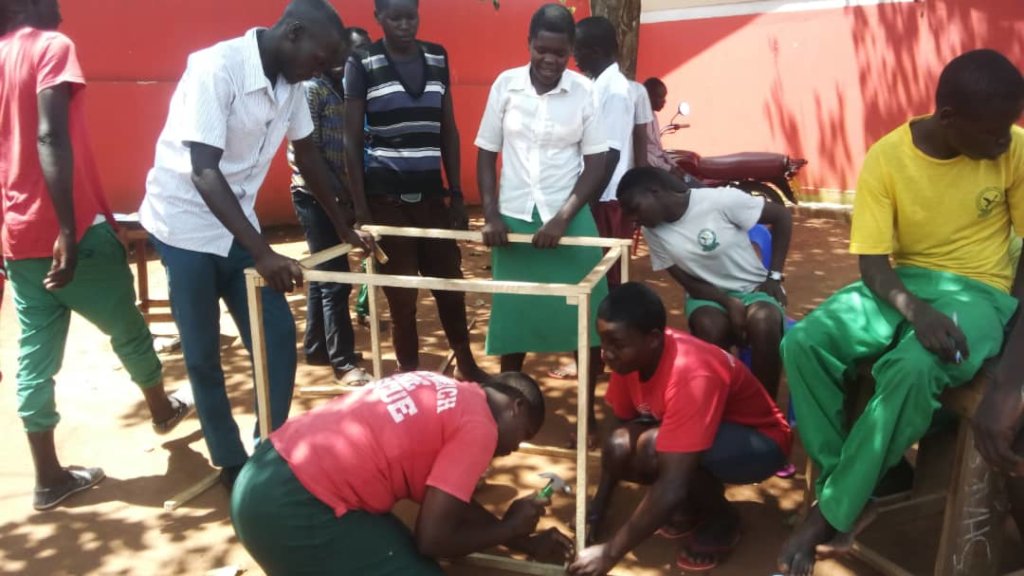By Erin Fitzgerald | Cofounder & Country Director
Term 2: Agricultural Engineering
It has been a busy Term 2 in our partner schools in Northern Uganda! At the end of Term 1, we concluded field research with local farmers in the community and narrowed down the technology of choice for Term 2 to be organic pesticide.
Our partner teachers are a strong, creative, and passionate group of educators! When we brought the idea of organic pesticide to them, they had an innovative idea. They requested free reign to work with students to use agricultural engineering to design an agricultural technology of their own choice. We agreed and told them: the sky is the limit!
Now at the end of Term 2 we are so excited to present the various technologies that our partner schools worked to develop over the past few months. Some schools decided to stick with organic pesticide and some designed a much different technology...
Cultivating Indigenous Microorganisms (IMOs) at St Katherines Girls School!
Students and teachers at St Katherines tackled the issue of soil infertility (and the resulting plant vulnerability to crop disease) by using agricultural engineering to cultivate indigenous microorganisms (IMOs). The application of IMOs has been shown to aid in mineral extraction and help with waste decomposition, as well as to boost the immunity of crops to various diseases.
Under the guidance of their teachers and our Yiya field team, St Katherines students researched how to cultivate IMOs. They designed a process for how to grow the IMOs in a small forest behind their school, and built the apparatus that would house the IMOs and their food. After a few weeks, they had great growth and harvested their first generation of IMOs! They have now begun experimenting with the application of this first prototype to their school crops! You can read more about IMOs and how St Katherines students developed their technology on our Yiya blog here.
Rapha Girls Secondary School and Bright Light College innovate affordable greenhouses!
Lira District in Northern Uganda, where our partner schools are, is a semi-arid region that suffers drought, with only intermittent rains during planting seasons. To tackle this challenge, our Yiya teachers at Rapha Girls School and Bright Light College designed an agricultural engineering unit that was centered on teaching students to create an affordable greenhouse that they can promote in their communities to help their parents grow crops even during the long stretches of dry season.
These small, low-cost greenhouses made from locally available resources trap water released during the evapotranspiration process of plants. They prevent water from evaporating so that the plants inside the greenhouse can reuse it once it has condensed back into the ground.
In this unit, students researched the water cycle by conducting experiments to test how much moisture different plants release during evapotranspiration. Click here to see video of these experiments! Each team of students at these two schools has built the first prototype of their own miniature greenhouse, which they will test next month once all greenhouses are complete!
Archbishop Orombi Secondary School and Lira Town College formulate organic pesticide!
Teachers and students at Archbishop Orombi and Lira Town College guided their students to apply their knowledge of science, mathematics, and agriculture to design a technology that solves the problem of crop pests. They created an organic pesticide which utilizes natural ingredients such as onion, garlic, neem, chili pepper, dish soap, as well as other local herbs to repel common pests. Students worked in groups to experiment with the bacterial and fungal-killing properties of the different ingredients they planned to use; then they harnessed those properties to create their organic pesticide. You can see students in action here!
Throughout this unit, students followed the iterative engineering design process of experimenting and prototyping until they came up with a high-quality product. Our partner teachers and the Yiya team supported these students throughout the engineering design process and then helped them make connections to local farmers around their schools. Students shared their final prototypes with these farmers who tried the pesticide samples on their crops. Farmers expressed how impressed they were that students had created such a high-performing product! They found that the student-formulated organic pesticide, when sprayed on crops, repelled many common crop pests.
Getting ready for the competition!
We are so proud of our Yiya partner teachers and students for all their hard work this term using agricultural engineering to design and create technologies to help farmers in their community. We are especially impressed with how teachers have taken the lead and stepped up to design their very own engineering lessons, with the Yiya team moving to more of a co-teaching, support role. What an amazing group of empowered, motivated, and talented educators who are truly committed to radically changing their communities through the hands-on, REAL education they provide to their students!
As we enter Term 3, our schools are now focused on testing and improving their prototypes to prepare them for the 2018 Yiya Interschool Engineering Competition & Showcase, which will be held at St Katherines Girls School on Saturday, Oct 6th!
Links:
Project reports on GlobalGiving are posted directly to globalgiving.org by Project Leaders as they are completed, generally every 3-4 months. To protect the integrity of these documents, GlobalGiving does not alter them; therefore you may find some language or formatting issues.
If you donate to this project or have donated to this project, you can receive an email when this project posts a report. You can also subscribe for reports without donating.


